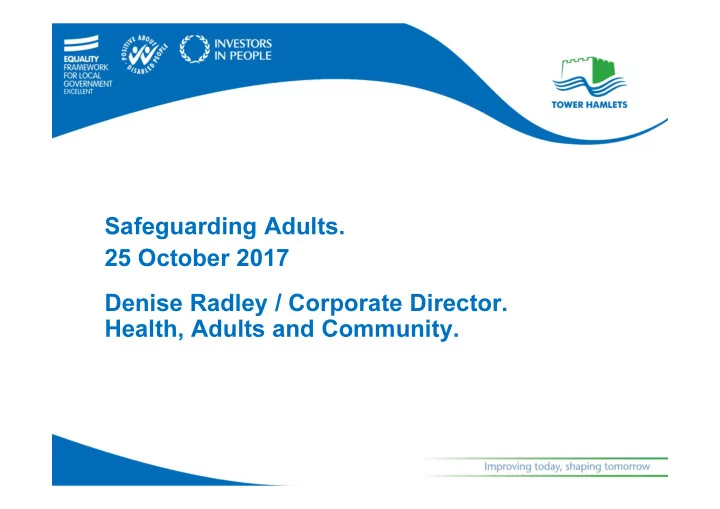

Safeguarding Adults. 25 October 2017 Denise Radley / Corporate Director. Health, Adults and Community.
Safeguarding Adult Annual Report 25 October 2017 Christabel Shawcross Independent Chair Safeguarding Adult Board.
Safeguarding Adult Board Safeguarding Adult Boards have three core duties, they must: • Develop and publish an Annual Strategic Plan setting out how they will meet their strategic objectives and how their members and partner agencies will contribute. • Publish an Annual report detailing how effective their work has been. • Arrange Safeguarding Reviews for any cases which meet the criteria, detailing the findings and subsequent action, (in accordance with Section 44 of the Act ).
6 Principles of Safeguarding Adults • Empowerment • Prevention • Proportionality • Protection • Partnership • Accountability
Multi-agency developments • Joint Strategy 2015-2019 / Business plan 2017-2018 • Launch of Making Safeguarding Personal • Executive Governance Group • Community Safety Partnership • Learning Disability Partnership • Local Safeguarding Children Board • Stay Safe event for people with a learning disability.
Safeguarding Adults Concerns 2015/16 & 2016/17
Safeguarding Adults - Gender
Safeguarding Adults - Ethnicity
Cases that proceeded to be investigated • 696 investigations conducted by social care teams found that the most common forms of abuse are: • Neglect 36% • Physical abuse 20% • Financial abuse 20% Abuse occurred in: • Own home 58% • Care homes 14%
Deprivation of Liberty Safeguards (DoLS) 2016/17 2015/16 Total Number of DOLS 660 2016/17 2015/16 613 2015/16, Total 885 2016/17, Total 1076 247 189 106 83 DoLS Authorised DoLS Not Authorised DoLS Withdrawn
Key areas for development • Performance data across partner agencies - improving data analysis and challenge • Hoarding, Self neglect, Modern Day Slavery, People Trafficking. • Joint Children and adults Webpages • Learning from Safeguarding Adult Reviews
Safeguarding Adult Reviews (SARs) Locally 6 SARs during 2016-17 period at different stages of completion . • 3 completed and published to date. • 2 SARS to be completed by March 2018 • Learning from SARs A report for the London safeguarding Adults Board July 2017. Key findings include… a) The quality of direct practice with the individual : Significant learning emerging in relation to a range of aspects of direct practice e.g. missing or poor mental capacity and or risk assessment. b) Organisational factors that influence how practioner work: poor record and recording, key information in case documentation absent or unclear. c) Inter professional and interagency practice : an absence of “think family approach to assessment of needs and risks. d) The SAB’s interagency governance role: Found to be positive as findings from SARs used to underpin training strategy.
Priorities for 2017/18 � Professionals to take a person centred and holistic approach to safeguarding. � Advocacy for individuals who lack mental capacity or difficulty in decision making. � Minimise repeat safeguarding issues. � Robust risk assessment and management arrangements involving adults, their families and carers. � Improving data analysis to measure outcomes. � Increase engagement of the SAB with vulnerable adults. � Ensure effective holding of agencies to account.
Recommend
More recommend